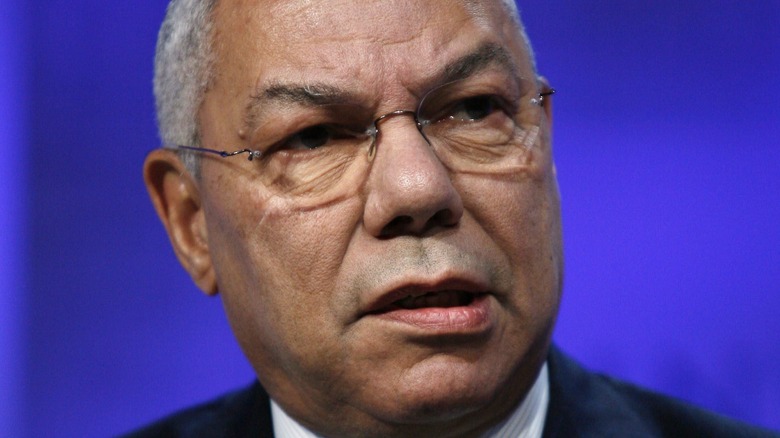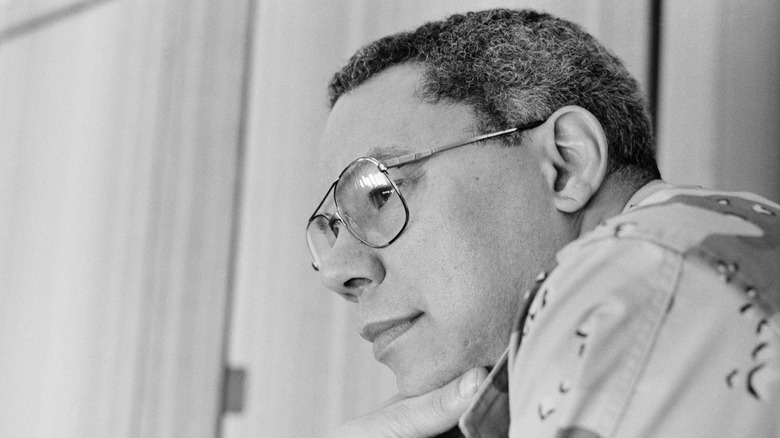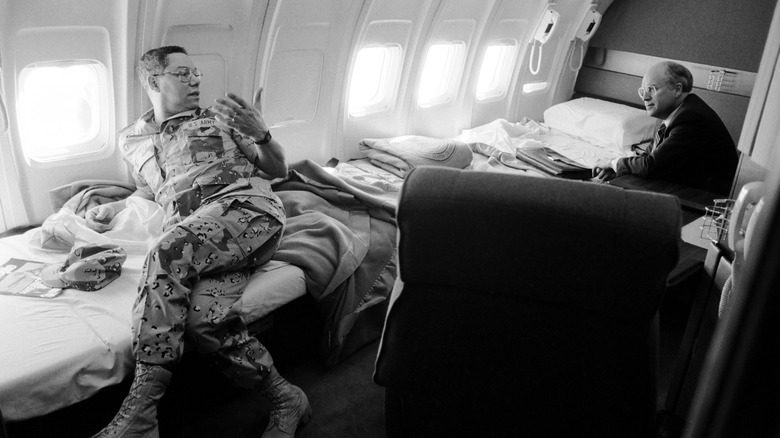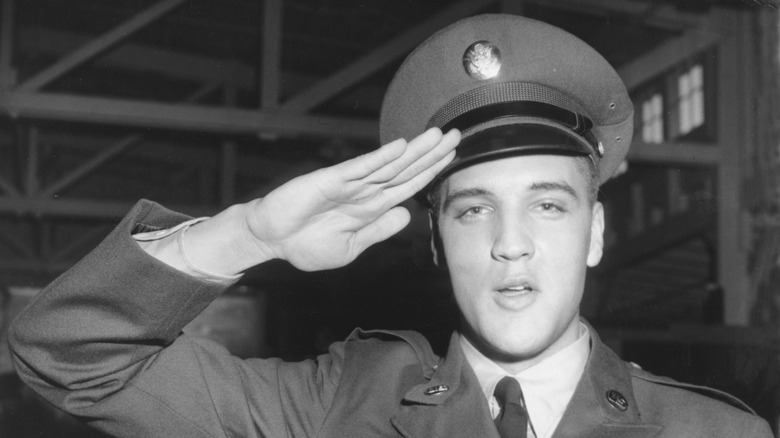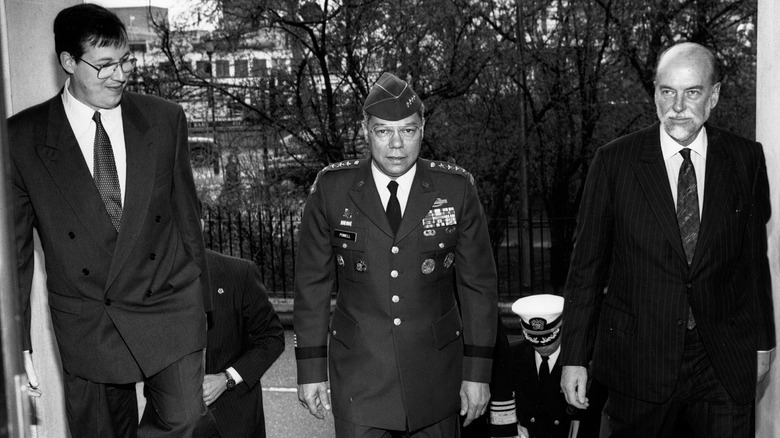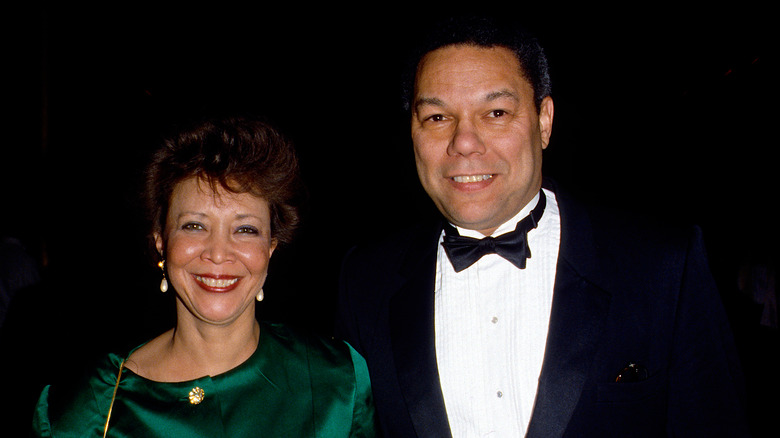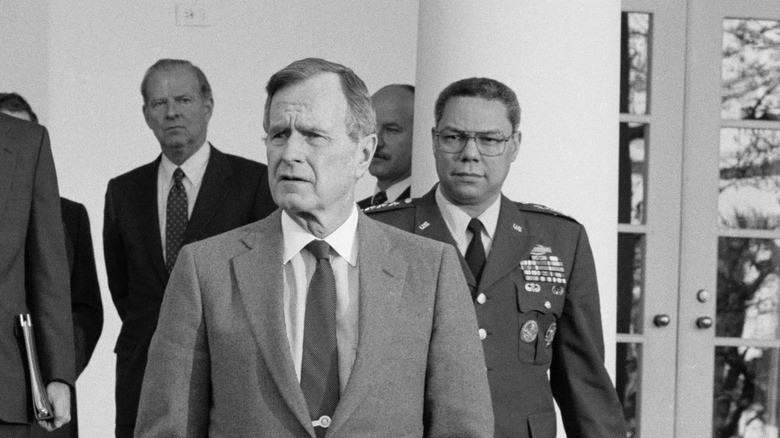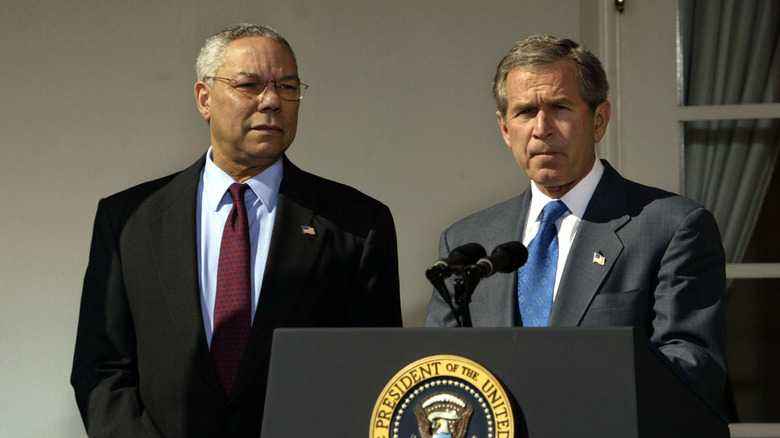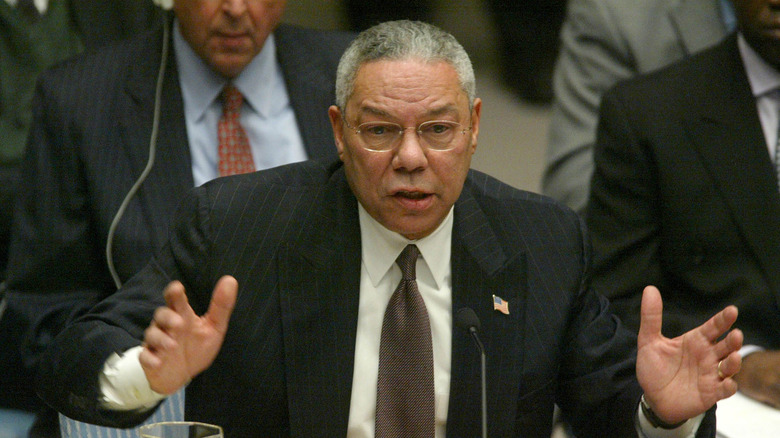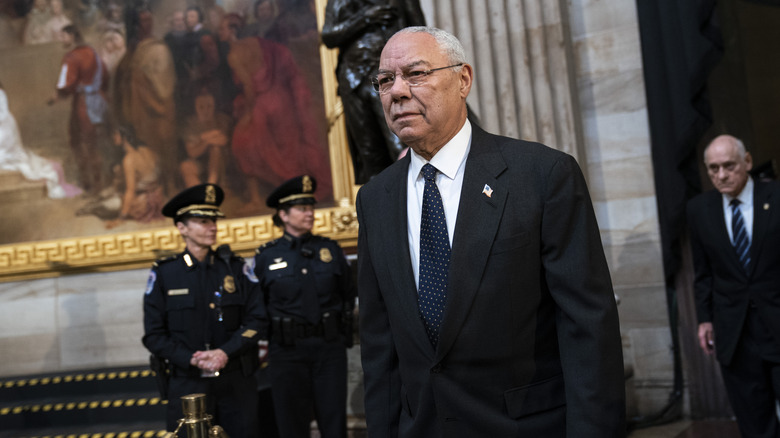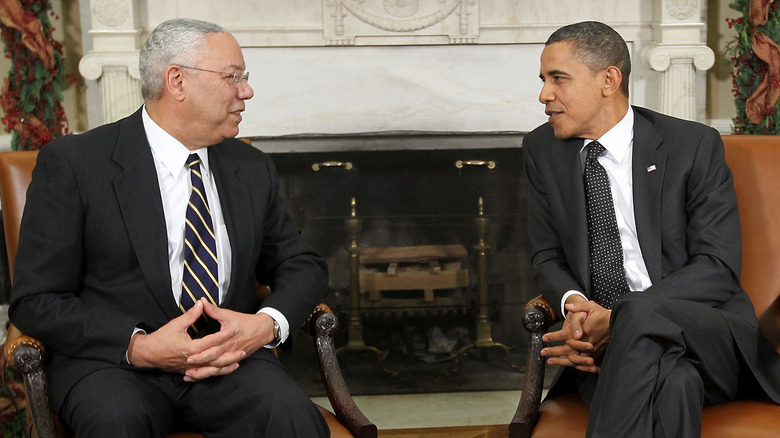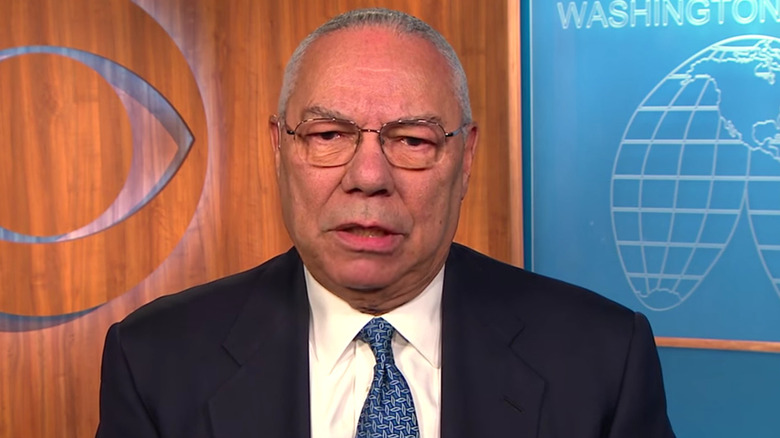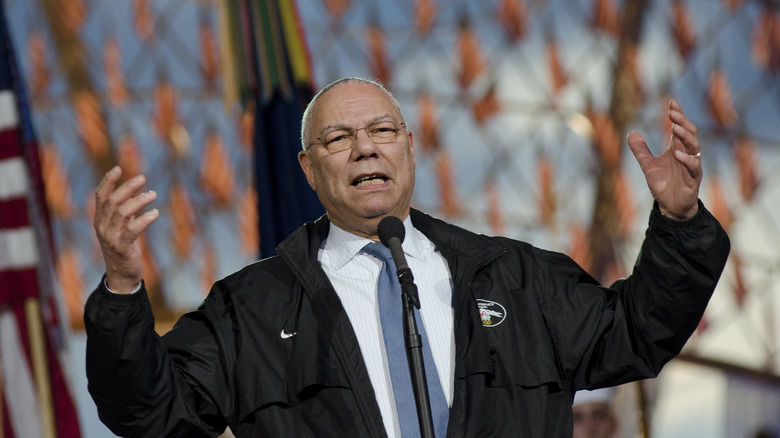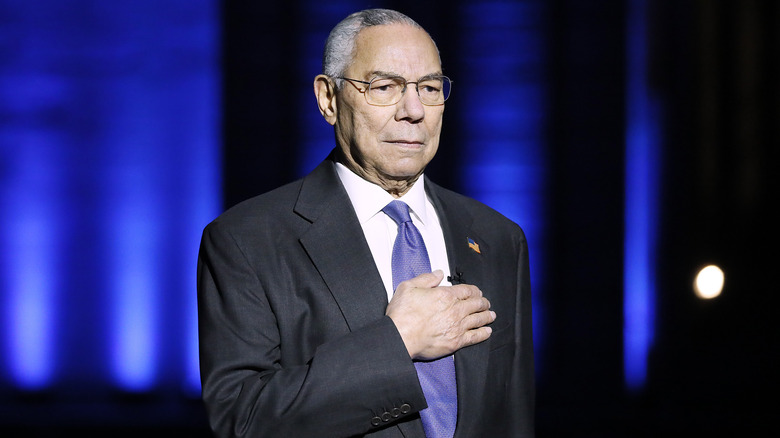The Untold Truth Of Colin Powell
Colin Powell, the first Black Secretary of State and a key player in former President George W. Bush's administration, died on October 18, 2021. At the time, his family announced on Facebook that the 84-year-old statesman, who was immunocompromised due to having a form of cancer called multiple myeloma (via CNN), had experienced complications from COVID-19 despite being vaccinated.
As he wrote in his autobiography, "My American Journey," Powell's life was "the story of a black kid of no early promise from an immigrant family of limited means who was raised in the South Bronx." Indeed, he grew up in New York as the son of Jamaican immigrants, attending public schools and going to the City College of New York — mostly, as Powell joked to the National Museum of African American History and Culture, because the program was free.
While studying geology, he found the Reserve Officer Training Corps and discovered his calling in the military. Keep reading to discover how that revelation led Colin Powell from his childhood in the Bronx to one of the most powerful positions in diplomatic service.
The truth about Colin Powell's name
Colin Powell's name has been confusing news anchors since he first became an important figure in the world of politics. In his "My American Journey" autobiography, Powell admitted that he added the long "oh" sound of "Colin" himself, thanks to World War II.
His Jamaican parents had named him Colin with the short "British pronunciation" that they were used to. But Powell changed his name's pronunciation because of a decorated war hero called Colin P. Kelly, who became famous as one of the first American pilots who died after Pearl Harbor, per the Military Times. "Colin Kelly's name was on every boy's lips, and so, to my friends, I became Coh-lin of Kelly Street," Powell wrote, adding that his parents didn't indulge his decision. "To my family, I remain Cah-lin to this day."
He also shared the reason that he had been called Colin in the first place. "I once asked my father why he had chosen the name, which I never liked," Powell wrote, recalling that he wondered whether some "illustrious ancestor" had inspire his parents. "Pop said no," Powell added. "He had read it off a shipping ticket the day I was born."
He was wounded twice in Vietnam
After discovering how much he enjoyed the Reserve Officer Training Corps, Colin Powell decided to join the U.S. military, which had only recently been "totally integrated." And as he told the NMAAHC, his family didn't always support his loyalty to the army. "I went to Vietnam twice and got hurt both times. They said, 'Oh god, the next time you go, they'll kill you,'" Powell said, joking that they only got on board with his decision after hearing about how much he would be paid if he continued on as a "professional soldier."
The first injury came while he was working as a field advisor, per his autobiography, when he stumbled on a Vietnamese "punji trap." "Suddenly my right leg went out from under me and I felt a sharp sting. I yanked my foot out of a small hole about a foot deep," Powell recalled. "I had stepped into a punji trap, and the spike had pierced through my boot into my foot." Out of "embarrassment," he didn't tell anyone and "limp[ed]" all the way back to camp, before starting the long healing process.
The soldier's second injury led to him receiving a medal. Powell was decorated for dragging three other soldiers out of a burning helicopter, as he wrote, after it crashed into a tree. Although he broke his ankle during the incident and the pilot broke his back, everybody survived.
Colin Powell served alongside Elvis
Colin Powell's experience in the military wasn't glamorous, even if he ended up meeting one of the most famous men in the world.
In his book, "My American Journey," Powell described meeting "a grimy, weary-looking sergeant" while he was in the 48th Infantry on a two-year tour of Germany. The sergeant saluted Powell and shook his hand. "It was Elvis Presley," the general revealed, adding that this was the only story from his army days that really shocked his children. "What impressed me at the time was that instead of seeking celebrity treatment, Elvis had done his two-year hitch, uncomplainingly, as an ordinary GI, even rising to the responsibility of an NCO," Powell added.
The King's dedication to the army clearly made an impact on Powell, since he also praised Presley on BBC Radio 4. "He served his country for two years, I saw him in the field, I ran across him in the woods while he was doing what every other GI does and he was thought of well enough by his commanders that he was promoted from private to sergeant before he left," Powell observed, insisting that he was never starstruck. "I see him as Elvis the soldier who, by the way, happened to be a celebrity."
He investigated the My Lai Massacre
One of the most shocking events of the Vietnam War was the 1968 My Lai Massacre, when U.S. troops killed at least 350 unarmed villagers. According to an official U.S. Army case study, Colin Powell, who was a major by that point, was actually involved in investigating the brutal mass murder. He had been "recently assigned" to the area, but "proved unable to uncover either wide-spread unnecessary killings, war crimes, or any facts related to My Lai."
When a soldier reached out in protest, Powell concluded that "in direct refutation of this portrayal, relations between American soldiers and the Vietnamese people are excellent," per the BBC. As the outlet noted, some criticized him for "whitewashing" or helping to cover up the atrocities, which were eventually exposed in 1970 and shocked the American public.
In a 2004 interview with Larry King, Powell spoke about the atrocities he had witnessed during the Vietnam War. "I mean, I was in a unit that was responsible for Mylai. I got there after Mylai happened," he stated, according to the U.S. Department of State archives. "So, in war, these sorts of horrible things happen every now and again, but they are still to be deplored."
Colin Powell's wife and kids
In 1962, Colin Powell married speech pathologist and audiologist Alma Johnson in her home state of Alabama, per his autobiography, and the couple had three children over the course of almost six decades together.
One of their sons would grow up to be former Federal Communications Commission chairman Michael K. Powell. George W. Bush selected him to lead the FCC in 2001, and he stayed in the role until 2005, later becoming a lobbyist. Their daughter, Linda, went down another path: according to her IMDb page, she's an actor who has appeared in shows like "Chicago Fire" and "Madame Secretary." Meanwhile, daughter Annmarie has worked as a producer, but tends to remain out of the spotlight, unlike to the rest of the Powell family.
Unfortunately, Colin's personal life made headlines in 2013 when he was accused of having an affair after his emails with a Romanian politician were leaked. "Over time the emails became of a very personal nature," he admitted in a statement to The Smoking Gun after a hacker published his correspondence with the diplomat Corina Cretu, who called Colin "the love of her life" and sent him photos. "Those type of emails ended a few years ago. There was no affair then and there is not one now," he insisted.
Following Colin Powell's death, Linda shared a sweet throwback family photo on Instagram, writing, "This was us. My heartbroken family thanks you for all your thoughts and prayers."
What's the Powell Doctrine?
Colin Powell became a household name through his televised updates about the Gulf War. "First we're going to cut it off, then we're going to kill it," he famously commented about the Iraqi army, per The Washington Post. The four-star general was by then overseeing American military action in various countries, like the 1989 invasion of Panama. He was cautious about getting involved in another long-running unwinnable war like Vietnam, which earned him a reputation for being reluctant and helped form his characteristic Powell Doctrine.
"I think the Powell Doctrine is pretty good military strategy and I'm proud to have a doctrine named after me that really is classic military thought," the statesman told NBC's Rachel Maddow in 2009, summarizing his outlook. "Decide what you are trying to achieve politically and if it can't be achieved through political and diplomatic and economic means, and you have to use military force, then make sure you know exactly what you're using the military force for and then apply it in a decisive manner."
Colin Powell was the first Black Secretary of State
Colin Powell was a groundbreaking figure in politics. In 1989, then-President George H.W. Bush appointed him Chairman of the Joint Chiefs of Staff, and Powell was elevated to the "highest military position" a person could hold in the U.S. Department of Defense, according to the BBC. Per the outlet, he was not only the youngest chairman ever, since he was only 52 at the time, but also the first Black officer to ever rise through the ranks that far. Powell then became the first Black Secretary of State under George W. Bush.
He was also considered a potential candidate for the 1996 presidential election, which would have made him the first Black president. Powell declined to run, however. "Let me say how honored I am that so many of you thought me worthy of your support," he told the press, per his autobiography. "It says more about America than it says about me. In one generation, we have moved from denying a black man service at a lunch counter to elevating one to the highest military office in the nation and to being a serious contender for the presidency. This is a magnificent country, and I am proud to be one of its sons."
His infamous United Nations speech
One of the turning points of Colin Powell's life came when he was asked to testify in front of the United Nations in 2003 about the "weapons of mass destruction" that had reportedly been discovered in Iraq. Although his claims were used as justification for America going to war, it turned out that they were false: per The Guardian, Iraq hadn't been producing or stockpiling any WMDs at all.
"There can be no doubt that Saddam Hussein has biological weapons and the capability to rapidly produce more, many more," Powell insisted in his UN Security Council speech, adding that there was "no doubt" in his mind that the Iraqi leader was trying to build up a nuclear weapons program. According to a book by Karen DeYoung, however, Powell was apparently already questioning the shaky intelligence before the testimony. "I wonder what we'll do when we put half a million troops on the ground in Iraq and search it from one end to the other — and find nothing," the general allegedly mused to his chief of staff, Larry Wilkerson, per Esquire.
Powell himself later called the speech "a great intelligence failure on our part" in an interview with PBS' Frontline: "Suddenly, the CIA started to let us know that the case was falling apart. ... It was deeply disturbing to me and to the president [George W. Bush], to all of us, and to the Congress, because they had voted on the basis of that information."
Colin Powell 'regretted' his role in the Iraq War
In 2011, Colin Powell admitted in an interview with Al Jazeera that he regretted his role in justifying the Iraq War. By that point, according to one study published by the BBC, over 450,000 deaths had been caused by the war, and Powell had long been accused of lying to the United Nations.
"It turned out, as we discovered later, that a lot of sources that had been attested to by the intelligence community were wrong," Powell confessed to Al Jazeera, adding that he "deeply regret[ted]" giving incorrect information to the UN. "It has blotted my record, but — you know — there's nothing I can do to change that blot. All I can say is that I gave it the best analysis that I could." He also described how he had delivered his speech after being given "four days' notice," noting that everything he said had been "gone over by the director of the Central intelligence Agency and his deputy director and all experts."
Powell added, "There is nothing that I made up; there's nothing that I stuck in there." Alleging that other people had attempted to include unconfirmed claims in the speech but he had rejected their contributions, he continued, "And so when I presented that information, it was information that the president believed in; information that my colleagues in government believed in."
The republican endorsed Obama
After leaving the Bush administration, Colin Powell upset his fellow republicans by publicly endorsing Barack Obama in the 2008 presidential election.
Powell appeared on NBC's "Meet the Press" and unexpectedly declared that the democrat's campaign looked more promising than that of his rival, Senator John McCain. "I think he is a transformational figure, he is a new generation coming onto the world stage, onto the American stage, and for that reason, I'll be voting for Senator Barack Obama," Powell stated. He also criticized McCain's campaign for choosing Sarah Palin as a running mate, commenting that the republican party had "moved more to the right than I would like to see it." In particular, Powell disapproved of Islamophobic attacks on the democratic presidential candidate, a Christian who was falsely claimed to be Muslim by certain republicans.
As CNN reported at the time, Obama rang the statesman up to thank him. "I have been honored to have the benefit of his wisdom and counsel from time to time over the last few years, but today, I am beyond honored and deeply humbled to have the support of General Colin Powell," the future president told his followers at a North Carolina rally afterward. And the two men's relationship was just as strong in 2012, per CBS News, when Powell gave Obama his endorsement again.
Colin Powell rejected the republican party
In his later years, Colin Powell found himself increasingly at odds with his own party. He declared that the race for the GOP nomination had "gone into the mud" in 2016, comparing it to a reality show and telling CBS Mornings that the "nastiness" made America look bad.
The last straw came when then-President Donald Trump's followers tried to overthrow the Capitol in January 2021, however, which Powell argued was the result of the republican party's slide into extremism. "That's why I can no longer call myself a fellow Republican," he told CNN. "I'm not a fellow of anything right now. I'm just a citizen who has voted Republican, voted Democrat throughout my entire career. And right now I'm just watching my country and not concerned with parties."
He also insisted that the politicians closest to Trump should have contained him. "They should have known better, but they were so taken by their political standing and how none of them wanted to put themselves at political risk," Powell asserted, questioning his party's priorities. "They would not stand up and tell the truth or stand up and criticize him or criticize others."
What was Colin Powell's net worth?
Colin Powell was cautious about money in his early years: as he described in "My American Journey," the soldier didn't even buy his wife, Alma, an engagement ring since he thought "we would be better off spending the money on household items." But by the end of his life, Powell had less reason to worry.
Celebrity Net Worth estimates that through speaking engagements, multi-million-dollar book deal, as well as his various prestigious jobs, Powell earned a fortune of $60 million. In the 1990s, he began earning fees of between $64,000 and $100,000 per public appearance, since he was such a well-known figure. The former Secretary of State was clearly smart enough to follow the money, since he made "109 speaking engagements" in just 2000 and reportedly banked $7 million. According to Crunchbase, he was also a board member or advisor at seven different organizations, including Bloom Energy and Howard University, although he primarily worked with the venture capital firm Kleiner Perkins as a Strategic Limited Partner. These roles would have provided Powell with different sources of income, especially since he owned a significant amount of stock, as Wallmine uncovered.
So, how did Colin Powell enjoy his fortune? Well, we can't say for certain, as the late diplomat was notably mum on his financial success. But, known for his love of restoring old cars — particularly Volvos — we do know that he made a savvy real estate move in 2016, and resided with his wife in their beautiful home in McLean, Virginia.
Colin Powell was diagnosed with cancer
After a long and singular life, Colin Powell died from COVID-19 complications, as previously mentioned, in October 2021. "We want to thank the medical staff at Walter Reed National Medical Center for their caring treatment," his family wrote in their Facebook announcement. "We have lost a remarkable and loving husband, father, grandfather, and a great American." Joe Biden also paid tribute to his old friend, per CNN, who "embodied the highest ideals of both warrior and diplomat."
The president also clarified that despite being vaccinated, Powell was vulnerable thanks to his pre-existing underlying conditions. The general had been diagnosed with multiple myeloma, a type of cancer that affects plasma cells in the blood and weakens immunity. "That's the problem," Biden insisted. "It wasn't that the vaccinations aren't good. He had two very serious underlying conditions and unfortunately, it didn't work. God love him."
Powell also had Parkinson's, as he revealed in a phone call to journalist Bob Woodward back in July 2021. "I've got multiple myeloma cancer, and I've got Parkinson's disease. But otherwise I'm fine," he reportedly told Woodward, who wrote about the interview in The Washington Post. "Don't feel sorry for me, for God's sakes! I'm [84] years old," Powell added. "I haven't lost a day of life fighting these two diseases. I'm in good shape."

